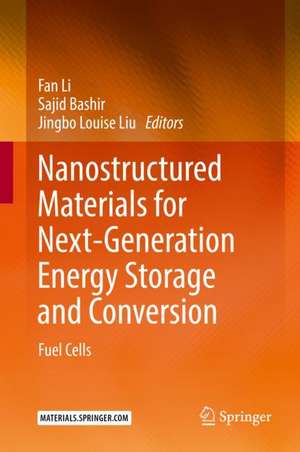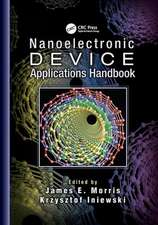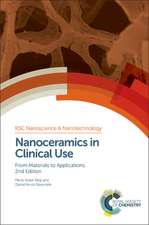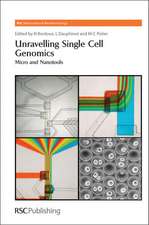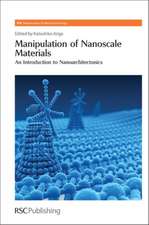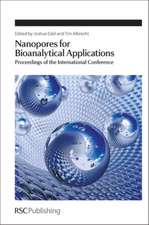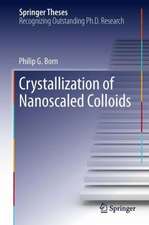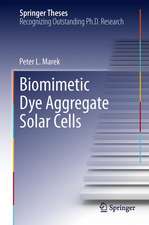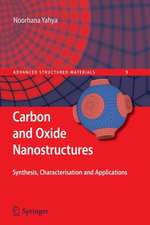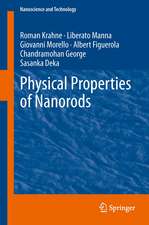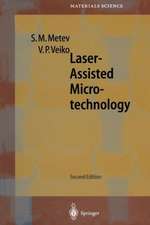Nanostructured Materials for Next-Generation Energy Storage and Conversion: Fuel Cells
Editat de Fan Li, Sajid Bashir, Jingbo Louise Liuen Limba Engleză Hardback – 4 mai 2018
The technical topics covered in this series are metal organic frameworks, nanoparticles, nanocomposites, proton exchange membrane fuel cell catalysts, solid oxide fuel cell electrode design, trapping of carbon dioxide, and hydrogen gas storage.
| Toate formatele și edițiile | Preț | Express |
|---|---|---|
| Paperback (1) | 1400.35 lei 22-36 zile | |
| Springer Berlin, Heidelberg – feb 2019 | 1400.35 lei 22-36 zile | |
| Hardback (1) | 1574.62 lei 38-44 zile | |
| Springer Berlin, Heidelberg – 4 mai 2018 | 1574.62 lei 38-44 zile |
Preț: 1574.62 lei
Preț vechi: 2044.97 lei
-23% Nou
Puncte Express: 2362
Preț estimativ în valută:
301.31€ • 315.38$ • 250.78£
301.31€ • 315.38$ • 250.78£
Carte tipărită la comandă
Livrare economică 26 martie-01 aprilie
Preluare comenzi: 021 569.72.76
Specificații
ISBN-13: 9783662563632
ISBN-10: 3662563630
Pagini: 614
Ilustrații: XLIV, 556 p. 214 illus., 149 illus. in color.
Dimensiuni: 155 x 235 x 28 mm
Greutate: 1.32 kg
Ediția:1st ed. 2018
Editura: Springer Berlin, Heidelberg
Colecția Springer
Locul publicării:Berlin, Heidelberg, Germany
ISBN-10: 3662563630
Pagini: 614
Ilustrații: XLIV, 556 p. 214 illus., 149 illus. in color.
Dimensiuni: 155 x 235 x 28 mm
Greutate: 1.32 kg
Ediția:1st ed. 2018
Editura: Springer Berlin, Heidelberg
Colecția Springer
Locul publicării:Berlin, Heidelberg, Germany
Cuprins
Fuel Cell Technology - Policy, Features, and Applications: A Mini-Review.- Concept of Hydrogen Redox Electric Power and Hydrogen Energy Generators.- Evaluation of Cell Performance and Durability for Cathode Catalysts (Platinum Supported on Carbon Blacks or Conducting Ceramic Nanoparticles) During Simulated Fuel Cell Vehicle Operation: Start-up / Shutdown Cycles and Load Cycles.- Metal Carbonyl Cluster Complexes as Electrocatalysts for PEM Fuel Cells.- Non-Carbon Support Materials Used in Low-Temperature Fuel Cells.- Noble Metal Electrocatalysts for Anode and Cathode in Polymer Electrolyte Fuel Cells.- Nano Materials in Proton Exchange Membrane Fuel Cells.- Nanostructured Electrodes for High-Performing Solid Oxide Fuel Cells.- Modelling Analysis for Species, Pressure, and Temperature Regulation in Proton Exchange Membrane Fuel Cells.- The Application of Computational Thermodynamics to the Cathode-Electrolyte in Solid Oxide Fuel Cells.- Application of DFT Methods to Investigate Activity and Stability of Oxygen Reduction Reaction Electrocatalysts.- Hydrogen Fuel Cell as Range Extender in Electric Vehicle Powertrains: Fuel Optimization Strategies.- Totalized Hydrogen Energy Utilization System.- Influence of Air Impurities on the Performance of Nanostructured PEMFC Catalysts.- Solid-State Materials for Hydrogen Storage.- Stress Distribution in PEM Fuel Cells. Traditional Materials and New Trends.- Recent Progress on the Utilization of Nano Materials in Micro-Tubular Solid Oxide Fuel Cell.- Nanostructured Materials for Advanced Energy Conversion and Storage Devices: Safety Implications at End-of-Life Disposal.
Recenzii
“This volume brings together an interesting collection of articles covering mainly hydrogen PEM and SOFC technologies that will help build a more balanced understanding of the commercialisation and technical challenges arising from catalyst behaviour through to stack design.” (Rob Potter, Johnson Matthey Technology Review, Vol. 63 (4), 2019)
Notă biografică
Dr. Bashir was chair of the American Chemical Society (ACS) South Texas Region (2011–2012); Dr. Liu was secretary/treasurer of the same section (2010–2011). Part of their leadership role was to invite elite speakers from top universities to come to the south Texas region to give technical presentations.
In 2012–2013, both Drs. Bashir and Liu co-organized a symposium on behalf of the National ACS Conference (COLLOIDAL division) in Indianapolis, IN, related to colloidal based bottom-up synthesis in nanofabrication related to environmental and energy aspects. At that conference, Dr. Liu separately co-organized energy talks on behalf of the ACS ENERGY division.
In March 2014, both Drs. Bashir and Liu co-organized an ACS symposium (COLLOIDAL division) in Dallas, TX, related to environmental cleanup using nano-engineered systems.
Both editors are therefore well known and well connected in this field to put forth an excellent book on this topic.
In 2012–2013, both Drs. Bashir and Liu co-organized a symposium on behalf of the National ACS Conference (COLLOIDAL division) in Indianapolis, IN, related to colloidal based bottom-up synthesis in nanofabrication related to environmental and energy aspects. At that conference, Dr. Liu separately co-organized energy talks on behalf of the ACS ENERGY division.
In March 2014, both Drs. Bashir and Liu co-organized an ACS symposium (COLLOIDAL division) in Dallas, TX, related to environmental cleanup using nano-engineered systems.
Both editors are therefore well known and well connected in this field to put forth an excellent book on this topic.
Textul de pe ultima copertă
The energy crisis and pollution have posed significant risks to the environment, transportation, and economy over the last century. Thus, green energy becomes one of the critical global technologies and the use of nanomaterials in these technologies is an important and active research area. This book series presents the progress and opportunities in green energy sustainability. Developments in nanoscaled electrocatalysts, solid oxide and proton exchange membrane fuel cells, lithium ion batteries, and photovoltaic techniques comprise the area of energy storage and conversion. Developments in carbon dioxide (CO2) capture and hydrogen (H2) storage using tunable structured materials are discussed. Design and characterization of new nanoscaled materials with controllable particle size, structure, shape, porosity and band gap to enhance next generation energy systems are also included.
The technical topics covered in this series are metal organic frameworks, nanoparticles, nanocomposites, proton exchange membrane fuel cell catalysts, solid oxide fuel cell electrode design, trapping of carbon dioxide, and hydrogen gas storage.
The technical topics covered in this series are metal organic frameworks, nanoparticles, nanocomposites, proton exchange membrane fuel cell catalysts, solid oxide fuel cell electrode design, trapping of carbon dioxide, and hydrogen gas storage.
Caracteristici
Comprehensive and up-to-date assessment of the latest developments in the field of sustainable energy storage and conversion Written by a combination of experts in materials development and applications Particular emphasis on properties of nanomaterials that make them attractive for energy applications
